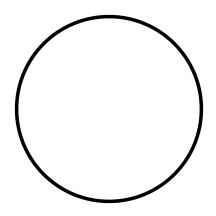The Kalam Cosmological Argument:
Premise:
Everything that begins to exist has a cause.
The universe began to exist.
Therefore, the universe must have a cause.
Premise 1: Everything that begins to exist has a cause.
Objection:
Not everything needs a cause—quantum events, like virtual particles appearing in a vacuum, seem to occur without a cause.
Rebuttal:
Quantum events do not occur in absolute nothingness. They happen within the framework of quantum fields governed by physical laws. The quantum vacuum is not “nothing”—it is a sea of energy and potential, which itself exists and follows rules. Moreover, quantum indeterminacy does not imply causelessness; it simply indicates that the outcomes are probabilistic, not strictly determined.
This premise also specifies things that begin to exist, meaning things that transition from non-existence to existence. There is no known example of something coming into being from absolute nothing without a cause.
Premise 2: The universe began to exist.
Objection:
The universe may be eternal. Theories like the cyclic or oscillating universe suggest that the cosmos could be infinite in time with no real beginning.
Rebuttal:
Modern cosmology strongly supports the idea that the universe had a beginning. The Big Bang theory, backed by empirical evidence such as the cosmic microwave background radiation and the redshift of galaxies, points to a universe that emerged from a singular point in the finite past.
Even alternative models, like the bouncing or cyclic universe, cannot avoid a beginning. The Borde-Guth-Vilenkin Theorem states that any universe which, on average, has been expanding must have a past boundary. This includes most versions of inflationary and multiverse models.
Philosophically, the concept of an actual infinite past leads to contradictions (such as Hilbert’s Hotel) and makes the arrival of the present moment impossible. Therefore, both scientific and logical reasoning affirm that the universe began to exist.
Conclusion: Therefore, the universe must have a cause.
Objection:
Even if the universe has a cause, why assume it is God? Couldn’t it be a multiverse, or some unknown natural mechanism?
Rebuttal:
Once we accept that the universe has a cause, we can deduce certain attributes of this cause:
Uncaused, to avoid an infinite regress of causes.
Immaterial, because it created matter and space.
Timeless, since time itself began with the universe.
Powerful, to bring the universe into existence from nothing.
Personal, as only a conscious agent can choose to create a finite effect (the universe) from a changeless state.
These qualities align with what we traditionally call God. Invoking a multiverse doesn’t solve the problem—it merely shifts it back. What caused the multiverse? The need for a first, uncaused cause remains.
This leads us to explore five critical considerations:
Could the universe be its own cause?
Did the universe come into existence due to probability?
If not the universe or probability, is there some other cause—an ultimate or first cause?
Must the first cause be uncaused?
What attributes must the first cause possess?
1. Can the Universe Be Its Own Cause?
The universe cannot precede itself to cause itself. For something to bring itself into existence, it would have to both exist and not exist at the same time—a clear logical contradiction. That makes self-causation impossible. So, the universe cannot be the cause of its own existence; it must have been caused by something else.
Think of it this way: just as a mother cannot give birth to herself, the universe cannot create itself.
2. Could Probability Have Caused the Universe?
Probability does not have causal power—it merely describes the likelihood of possible outcomes. It’s a mathematical tool, not an active agent. Saying the universe came into existence due to probability is like claiming Newton’s Laws caused an apple to fall from a tree. Laws of motion describe what happens under certain conditions, but they do not make things happen. Similarly, probability can describe the chance of something occurring, but it does not bring anything into being.
3. Is There a First Cause Beyond the Universe and Probability?
If the universe cannot cause itself, and probability is not a cause, then something else must have caused the universe. But then, what caused that cause? If we continue asking this question infinitely, we never arrive at an answer. This is known as an infinite regress, which leads to absurdity.
Just as a row of falling dominoes must begin with one that is pushed first, the chain of causes must begin with a cause that itself was not caused. This first cause is necessary for anything to exist at all.

4. Why Must the First Cause Be Uncaused?
Let us consider the following reasoning:
a. In the world, we observe a chain of efficient causes—each cause producing an effect.
b. No thing can be the efficient cause of itself, as that would require it to exist before it exists.
c. An infinite regress of causes is logically impossible—if there were no first cause, there would be no subsequent effects.
d. Therefore, there must be a first, uncaused cause—a necessary being that set everything else into motion.
e. This uncaused first cause is what people commonly call God.
5. What Must Be the Nature of the First Cause?
The first cause must be:
Uncaused – it exists necessarily, not dependently.
Eternal – not bound by time or change.
Immaterial – since all material things are subject to change and decay.
Powerful – to bring the universe into existence.
Possessor of Complete Knowledge
Without knowledge, purposeful action is impossible. Imagine someone trying to make tea without knowing what tea is, or how to make it. Knowledge involves understanding:
What to create
Where to create it
How to bring it into existence
The First Cause must have comprehensive knowledge of all aspects of creation.
All-Wise (Possessor of Will)
Will is the driving force behind purposeful creation. It determines why something should be created, and when. Without will, even knowledge and power remain unused. The First Cause must act with wisdom, intentionality, and purpose—not blindly or randomly.
- Intelligent – the design, order, and fine-tuning of the universe suggest intentionality.
Hazrat Mirza Ghulam Ahmad of Qadian (as) – The Promised Messiah – beautifully supports this argument in The Philosophy of the Teachings of Islam:
“The second proof of the existence of God that the Holy Qur’an has set forth is that God is the ultimate cause of all causes…
وَأَنَّ إِلَىٰ رَبِّكَ الْمُنتَهَىٰ
‘And that to your Lord is the final end.’ (The Holy Qur’an, 53:43)”
He explains that the entire universe operates within a system of cause and effect. Every cause is either primary or dependent on another. But this chain cannot continue indefinitely in a finite world. It must terminate in an ultimate cause—God.
“The system of cause and effect terminates in God.”
(The Philosophy of the Teachings of Islam, p. 88)
No Beginning, No End:
Not everything has a beginning or an end.
A circle, for example, has no starting or endpoint.
Similarly, God is beyond time and space—without beginning and without end.
He is Al-Awwal (The First) and Al-Akhir (The Last).
The necessary, eternal, and intelligent cause of all that exists.

The Holy Qur’an in regards to the Big Bang:
1. The Big Bang: (21:31)
Do not the disbelievers see that the heavens and the earth were a closed-up mass, then We opened them out?
2. Expanding Universe: (51:48)
And we have built the heaven with might and we continue to expand it indeed.
3. Conclusion of the Universe: (21:105)
Remember the day when We shall roll up the heavens like the rolling up of written scrolls by a scribe. As We began the first creation, so shall We repeat it — a promise binding upon Us; We shall certainly perform it.
4. Repeat of the Universe: (14:49)
On the day when this earth will be changed into another earth, and the heavens too; and they will all appear before Allah, the One, the Most Supreme;
Abu Hamid Al-Ghazali (r.h) writes:
“The mere physicist is like an ant who, crawling on a sheet of paper and observing black letters spreading over it, should refer the cause to the pen alone. The astronomer is like an ant of somewhat wider vision who should catch sight of the fingers moving the pen, i.e., he knows that the elements are under the power of the stars, but he does not know that the stars are under the power of the angels. Thus, owing to the different degrees of perception in people, disputes must arise in tracing effects to causes. Those whose eyes never see beyond the world of phenomena are like those who mistake servants of the lowest rank for the king. The laws of phenomena must be constant, or there could be no such thing as science; but it is a great error to mistake the slaves for the master.
As long as this difference in the perceptive faculty of observers exists, disputes must necessarily go on. It is as if some blind men, hearing that an elephant had come to their town, should go and examine it. The only knowledge of it which they can obtain comes through the sense of touch; so one handles the animal’s leg, another his tusk, another his ear, and, according to their several perceptions, pronounce it to be a column, a thick pole, or a quilt, each taking a part for the whole. So the physicist and astronomer confound the laws they perceive with the Lawgiver.
…
There are some who, failing to find God by observation, conclude that there is no God and that this world of wonders made itself, or existed from everlasting. They are like a man who, seeing a beautifully written letter, should suppose that it had written itself without a writer, or had always existed. People in this state of mind are so far gone in error that it is of little use to argue with them. Such are some of the physicists and astronomers to whom we referred above.” (The Alchemy of Happiness)
Hazrat Mirza Ghulam Ahmad of Qadian (a.s) writes:
“Of course it is true that reason is not without its use and its benefit, and when have I ever said that it is useless? Nevertheless, how can we escape the obvious fact that through reason and conjecture, alone, we cannot attain the treasure of perfect certainty which can be achieved through the combination of reason and revelation…” (Barahin-e-Ahmadiyya, Part 4. pg. 79)
There can never be physical evidence of God, because God is not a physical being. Therefore, the methods of experimental science—which rely on physical observation and measurement—are not applicable in this case. Instead, we turn to logical reasoning and philosophical analysis. These methods have been rigorously developed and form the foundation of historical inquiry, legal reasoning, and sociological understanding.
Final Thoughts:
We should be ready to discuss the question of God’s existence. Atheist use logic to support their arguments and actively convert people to their way of thinking. The same tool should be used to either correct their faulty reasoning or to help sincere inquirers find their way to a possibility of believing in a Supreme Being. This can make all the difference to the young people who are still open to see both sides of the question. Once they are converted to atheism, it is too late to expect objectivity from them. If a person wants to debate the subject just to show off his intellectual superiority, it is better not to waste one’s energy.
Reason alone may not lead to absolute certainty about the existence of God, but that doesn’t mean it should be dismissed. Logical reasoning still plays a crucial role in guiding the mind toward belief. Other methods—those that can lead to deeper certainty and spiritual enlightenment—will be discussed later.
“The Cause Beyond the Veil”
A Poetic Reflection
I stood beneath the trembling stars,
And watched the heavens weep with light—
Each spark a whisper from afar,
Each shadow draped in sacred night.
“From whence this world?” I dared to ask,
Where time began and silence broke—
What hand removed the nothing’s mask?
What breath the sleeping void awoke?
No child is born without a womb,
No rose from ash without a seed;
How then could all arise from tomb—
Of nothingness, without a need?
The stars, though blind, still seem to know
They dance to laws they can’t devise.
A cause must lie beyond their glow—
Unseen by thought, untouched by eyes.
Not chance, for chance is but a name,
A coin that flips—but needs a hand.
Not self—no thing can light its flame
Before it learns to even stand.
A will, eternal, wise, and free—
Not bound by time, nor forged from clay.
The first of all that came to be,
Who woke the dawn and shaped the day.
I call Him not by crafted sound—
But feel Him where all reasons end:
The First, the Last, the Cause profound—
The Unmoved Mover, God, my Friend.
